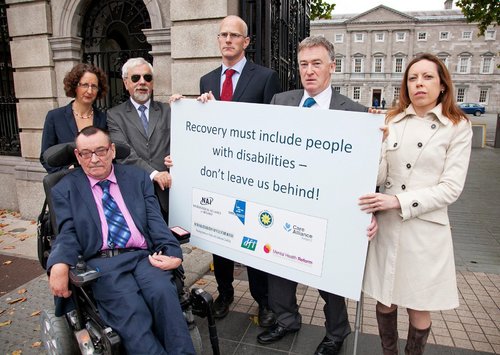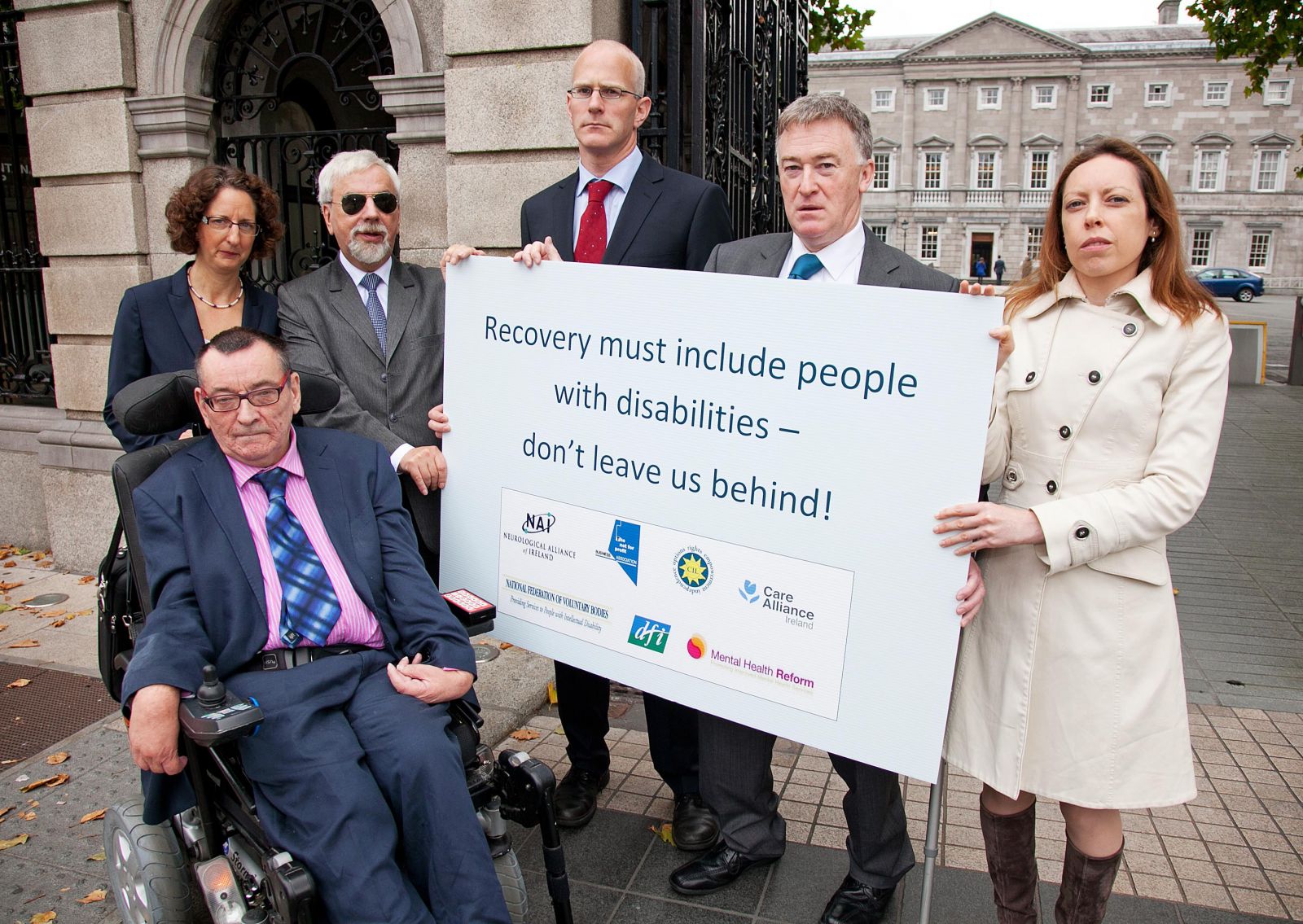Budget 2014 – Time for Government to demonstrate its commitment to People with Disabilities and those with Mental Health Needs
October 14 2013

Statement issued to media by eight national voluntary disability organisations in Buswells Hotel at 10.30am on Monday 30th September 2013

(L to R) Michael McCabe: Center for Independent Living, Shari McDaid : Mental Health Reform, Des Kenny : Not for Profit Business Association, Liam O'Sullivan : Care Alliance Ireland, John Dolan : Disability Federation of Ireland, Mags Rogers : Neurological Alliance of Ireland
(Issued on behalf of: 'Disability Federation of Ireland', 'Federation of Voluntary Bodies', 'Mental Health Reform', 'Care Alliance Ireland', 'Neurological Alliance of Ireland', 'Not for Profit Business Association' and 'Center for Independent Living')
Monday 30th September 2013
We the under-signed national voluntary disability organisations, representing the diversity of people and families with disabilities and conditions which are disabling, including mental health, make this joint statement to Government regarding Budget 2014.
In 2011, the government promised that they would “ensure that the quality of life of people with disabilities is enhanced.” They also made a commitment to “forging a new Ireland that is built on fairness and equal citizenship.” Despite these assurances, disability and mental health services have been hit hard by six consecutive budgets. The further ‘chipping away’ at both disability specific and mainstream supports over the past year constitutes a double hit and represents a complete lack of understanding of the challenges faced by people and families with disabilities and mental health issues trying to live an ordinary life with health and well-being.
Budget 2014 will provide us with a clear expression of government priorities. In recent budgets, the Governments focus has been largely economic. We are seeing the economic take precedence over the social. The two realms have become disconnected in practice yet remain firmly linked in reality. This is evident in the inconsistent approach of supporting austerity measures, while at the same time ‘aspiring’ to be socially inclusive. Government continues to support policy objectives promoting community living for people with disabilities while at the same time implementing cuts that undermine community based approaches to services and supports for people with disabilities.
We need to strategically plan for social inclusion and this planning should be demonstrated in Budget 2014. Furthermore, innovative, quality services and supports should not be targeted in this budget. Human rights and social inclusion should not become the collateral damage of this recession.
We are seeking a rebalancing of the recovery programme and the protection of, and investment in, people with disabilities and conditions which are disabling. Budget 2014 must be driven not only by fiscal considerations but by the adjacent pursuit of sustainable social outcomes.
Action by the Government is urgently needed to:
- Ensure funding for services and supports for people with disabilities. Cuts that erode the independence of people with disabilities result in a drastic reduction in their quality of life and leads to growing costs on the State in terms of hospital stays and more expensive care. All public and community based services and supports need to be accessible to people with disabilities.
- Halt reductions to the basic standard of living of people with disabilities requiring welfare support. This means recognising the extra costs that people with disabilities incur and noting their disproportionate likelihood of experiencing poverty.
- Elevate the role of the Minister of State for Disability, Equality, Mental Health and Older People to a Cabinet Minister position to reflect the fact that disability is a societal issue, and not a sectoral one, that stretches across the life cycle, affecting people of all ages and their families directly and indirectly. Reform is required to change how Government Departments operate, to achieve mainstreaming and person centred outcomes, and to ensure that these efforts are in line with the Government's implementation plan for the National Disability Strategy. These actions need to be driven from Cabinet level.
- Ensure the ambition, commitment and cultural shift required in reforming the public service exists to drive forward the delivery of the commitments in the National Disability Strategy. Robust implementation of the NDS will be required if Ireland is to fulfill its obligations under the United Nations Convention on the Rights of Persons with Disabilities, which is yet to be ratified.
ENDS
For further information, please contact:
John Dolan, CEO, Disability Federation of Ireland, 086 795 7467
Wally Young, Young Communications, 087 2471520
(Issued on behalf of: Disability Federation of Ireland, Federation of Voluntary Bodies, Mental Health Reform, Care Alliance Ireland, Neurological Alliance of Ireland, Not for Profit Business Association and Center for Independent Living)
